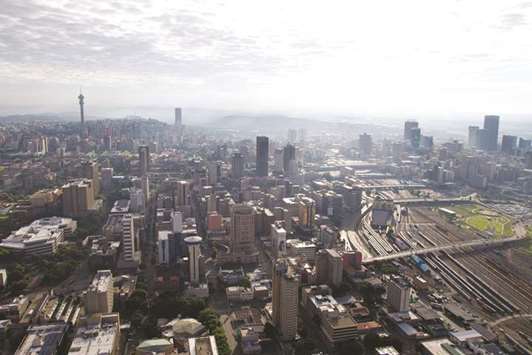South Africa’s plan to cut spending and raise taxes to stave off further debt downgrades may have unintended consequences – stunting the economic growth that ratings companies are demanding.
President Jacob Zuma told his Presidential Fiscal Committee to cut spending by 25bn rand ($1.8bn) in next year’s budget and to find ways to add 15bn rand to the nation’s revenue. These may include tax increases.
While these measures are aimed at staving off further ratings cuts, they could damp expansion in an economy that went through its second recession in less a decade this year. Slow growth lies at the heart of the government’s fiscal problems, S&P Global Ratings and Moody’s Investors Service said.
“Any increases in taxes right now are certainly going to have a damping effect on whatever growth prospects the economy might have,” George Herman, chief investment officer at Citadel Investment Services in Cape Town, said by phone.
Political uncertainty and conflict in the ruling party in the run-up to its leadership election next month has hamstrung efforts to boost growth in Africa’s most-industrialised economy. Zuma’s changes to his cabinet in March, in which he fired Pravin Gordhan as finance minister, caused the nation to lose its investment-grade status with two ratings companies for the first time in 17 years.
“We are looking for around 1% growth next year out the South Africa economy, and clearly that would assume no significant taxes,” Kevin Lings, chief economist at Stanlib Asset Management Ltd in Johannesburg, said by phone. “The trick here is going to be, what are other initiatives they announce that will lead to growth, and that will become the key question next year.” Finance Minister Malusi Gigaba painted a bleak picture of the nation’s finances in his mid-term budget last month, estimating a revenue shortfall of 50.8bn rand for the 2018 fiscal year projecting that government debt would exceed 60% of gross domestic product by 2022. The economic impact of further expenditure cuts or tax hikes could be counter-productive, he said.
On November 24 S&P lowered the nation’s rand debt to junk and cut the foreign-currency rating to two levels below investment grade. Moody’s put its assessments on review for a downgrade in the next 90 days.
Gigaba will present details of the planned spending cuts and revenue increases in the 2018 budget on February 21. While Moody’s said it may not conclude its review until the size and the composition of the fiscal plan is known, ratings companies will also monitor the results of the African National Congress’s leadership election, which is widely seen as a head-to-head contest between Zuma’s ex-wife and former African Union Commission chairwoman, Nkosazana Dlamini-Zuma, and Deputy President Cyril Ramaphosa.
The ratings companies may see Zuma’s plan as positive for the economy if it’s executed “but I don’t think it really holds a lot of weight for them unless implemented for the longer term,” Russell Lamberti, a chief strategist at ETM Investment Services in Cape Town, said by phone.
“These are very short-sighted and very short-term solutions,” he said. “It doesn’t solve our fundamental problem, which is the ongoing growth in the size of expenditure over time.”

Traffic highways cross railway tracks in this aerial skyline view of commercial and residential property in Johannesburg (file). South Africa’s plan to cut spending and raise taxes to stave off further debt downgrades may have unintended consequences u2013 stunting the economic growth that ratings companies are demanding.
